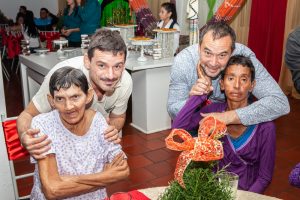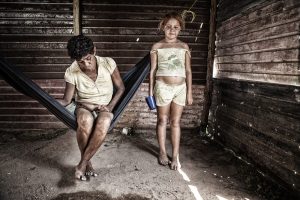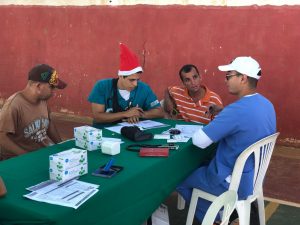Factor-H Reaches Out to Huntington’s Neglected Families of South America
Written by |

Ignacio Muñoz-Sanjuan, right, attends a Christmas dinner in Venezuela with an associate and two Huntington's patients. (Photo courtesy of FactorH)
Huntington’s disease affects an average of 1 in 10,000 people worldwide. But in small, remote pockets of South America, its prevalence skyrockets to nearly 1 in 10.
Reasons identified for this include geographic isolation, marriage between cousins, high reproduction rates, and a lack of education.
The nonprofit organization Factor-H aims to help lift impoverished Huntington’s disease patients and their families in Colombia, Peru, and Venezuela through improved medical care, community centers and family planning.
Researcher Ignacio Muñoz-Sanjuan started Factor-H along with Claudia Perandones, Argentine physician with a specialty in molecular biology, in 2012. They formally registered their organization two years ago in Los Angeles. He’s now president of the organization.
The village of Barranquitas in Venezuela’s Zulia state is an oft-cited example of the havoc Huntington’s can wreak on poor societies. Researchers working in the area identified the location of the mutated huntingtin gene in 1993 based on DNA from patients there.
Because it’s a genetic disorder, each child of carrier parents has a 50% chance of developing the disorder. In isolated areas where intermarriage between cousins or other relatives occurs, the prevalence of Huntington’s increases exponentially. Muñoz-Sanjuan has seen up to 1,300 cases of the disease within five generations.
The neuroscientist and Huntington’s expert, 48, received his doctorate in molecular biology at Johns Hopkins University and post-doctorate at New York’s Rockefeller University. He then took a job at Merck in the U.K., which led to his research position with the CHDI Foundation.
He told Huntington’s Disease News in a phone interview that a 2008 trip to Mexico and a visit to Brazil two years later changed his entire perspective.
Locked away, left to die
The trips were to set up a clinical network in Latin America on behalf of CHDI, the nonprofit where he’s now vice-president of translational biology. His objective was to establish standards of care for neurology centers so they could participate in future clinical studies.
During these visits, the native of Spain learned the magnitude of the problem and the condition of villages ravaged by the disease. In 2012, he toured Zulia state as well as Colombia’s departments of Atlantico and Magdalena on the Caribbean coast.
The stigma behind the disease was instantly evident to Muñoz-Sanjuan; few families offered any help to Huntington’s patients, who were often locked away in their rooms and left to die.
”I decided at the time I couldn’t just go back home and pretend to care about treating patients and ignore all of this,” Muñoz-Sanjuan said.
He unofficially launched the organization in Mendoza, Argentina, shortly after that first 2012 visit. Back then, it was known simply as “The Project.” Muñoz-Sanjuan and Perandones were on their own for a couple of years as they assisted local patient organizations.
Eight years later, Factor-H still relies heavily on volunteer work. No board members or U.S. employees, except its executive director, Bianca Moura, takes a salary. It has four full-time employees in Colombia and eight in Venezuela, and also covers the salaries of several local partners.
Supporting patients with Huntington’s and at-risk children, while also helping to build their communities, is no easy feat. Funding operations across all three Andean countries primarily rely on U.S. and European donations. Funding is a mounting challenge for the small organization, said Muñoz-Sanjuan, adding that he partners with 15 local organizations to help reduce overhead.
From Venezuela to the Vatican
Working closely with Huntington’s patients has changed the worldview of Muñoz-Sanjuan, a researcher more at home with Petri dishes and pipettes.
“The ability to interact directly with Huntington’s families living in poverty changed my life on a personal level,” he said. “It puts a lot of things in perspective.”
Factor-H is exploring microfinance in disadvantaged communities, recently lending $3,000 to a family in Sabanas de San Ángel, Colombia, to purchase calves. It’s also finding partners in Colombia and Venezuela to help establish a larger program. The hope is that Huntington’s families will eventually pay the loans back and become financially independent.
Project Abrazos, which translates to “hugs,” focuses on delivering basic necessities such as food, clothing, shoes, and toys to children in at-risk families. It also provides medical and dental care. Volunteers, many of whom have aged out of the program themselves, take 101 Colombian and 37 Venezuelan children on field trips and recreational activities twice a year.
As fathers in these South American countries tend to leave mothers with Huntington’s, it often falls on the children to become caretakers, Muñoz-Sanjuan said. All have a 50% chance of developing the disease and fear what their future might hold.
The project creates more of “an environment where they have an appropriate childhood,” he said, explaining that his goal is to bring up a “new generation of people with social networks to support each other.”
In 2017, Factor-H sent children and families to the Vatican to meet Pope Francis and shed light on the disease. That program turned into the documentary “Dancing at the Vatican.” It also funds Art 4 HD, in which local artists — dancers, photographers and muralists — “bring into the open those who until now have been invisible.”
Muños-Sanjuan recently commissioned the Venezuelan photographer Vladimir Marcano to capture the lives of Huntington’s patients in Barranquitas and San Luís.
A street artist, DjLu Juega Siempre painted six murals in towns along the Caribbean coast and was set to do more before the COVID-19 pandemic struck.





